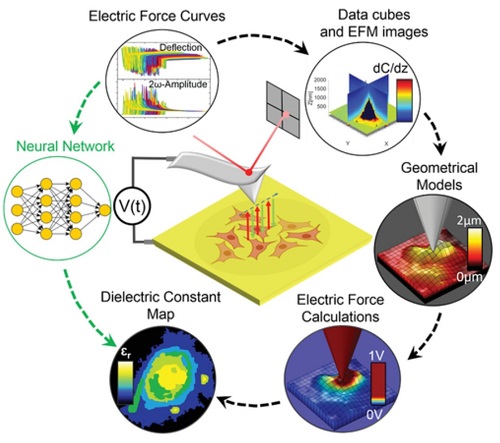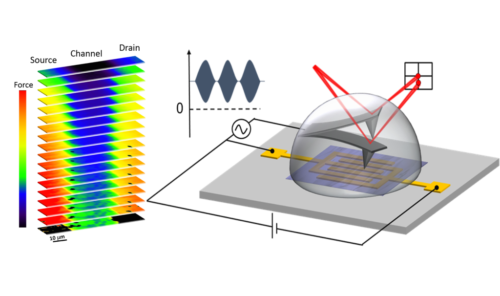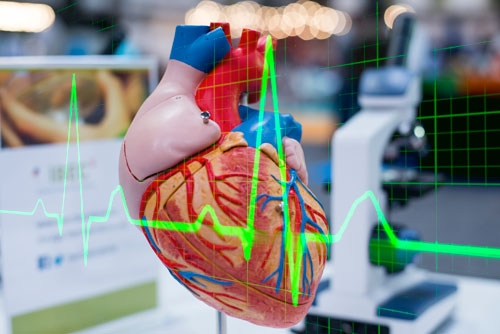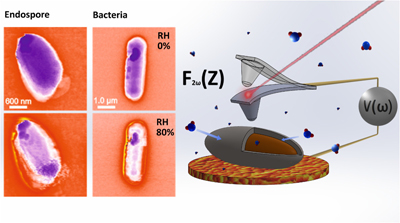Gabriel Gomila
Group leader
Machine learning reduces microscope data processing time from months to just seconds
With a new method that combines high-powered scanning force microscopes and machine learning, IBEC researchers have drastically reduced the processing time required to achieve nanoscale biochemical compositions map from electric images of eukaryotic cells in just seconds. Using earlier computation methods, processing one image could take even months.
Two IBEC researchers receive a Beatriu de Pinós fellowship
Aurora Dols and Zaida Álvarez, researchers at the Institute for Bioengineering of Catalonia (IBEC), receive the prestigious fellowships Beatriu de Pinós, awarded by the Catalan Government for the incorporation of highly qualified postdoctoral researchers into the Catalan research system.
Electric forces to characterize future biocompatible organic electronic devices
A joint collaboration between the Institute for Bioengineering of Catalonia (IBEC), the Institute of Materials Science of Barcelona (ICMAB) and The University of Manchester has succeeded in mapping the electrical properties of organic biosensor/electrolyte interfaces at the nanoscale by measuring local electric forces. Electronic biosensors based on organic materials could make soon a reality the dream of low-cost, disposable, flexible and biocompatible electronic devices for the interaction with biological systems .
A research team develop biotransistors able to hear small beats of live
Researchers at IBEC and ICMAB develop a flexible, cheap and biocompatible transistor platform able to record an electrocardiogram of cells and micro-tissues during long periods of time.
The platform, based on organic transistor technology (EGOFET), can also measure the effect of drugs on beating cells, as cardiomyocytes, opening the door to several applications such as implantable devices for health.
Water can be dead, electrically speaking
 Research led by the University of Manchester’s National Graphene Institute, with the collaboration with IBEC, reveals that water that’s only a few molecules thick – like the water that covers every surface around us – behaves very differently to normal, ‘bulk’ water.
Research led by the University of Manchester’s National Graphene Institute, with the collaboration with IBEC, reveals that water that’s only a few molecules thick – like the water that covers every surface around us – behaves very differently to normal, ‘bulk’ water.
Water is one of the most fascinating substances on Earth. At the heart of its many unusual properties is its high polarizability – that is, its strong response to an applied electric field.
Training the next generation of advanced microscopy experts
An IBEC group has been awarded EU funding to coordinate a project that aims to train a new generation of researchers in the science and technology of Scanning Probe Microscopes.
Thanks to the Marie Curie ITN funding, the ten consortium members of the SPM2.0 European Training Network – located in Spain, France, Austria, the UK and Italy – will be able to provide researchers with state-of-the-art multidisciplinary scientific training in the field of Scanning Probe microscopies, covering basic science to industrial applications, which should enable them to generate new scientific knowledge.
Using EFM to probe the secrets of bacterial endospore survival strategies
 An IBEC group has demonstrated, for the first time, that the hydration properties of a single bacterial endospore in varying environmental relative humidity can be determined with high accuracy and reproducibility, and in a non-destructive way, shedding new light on endospore survival strategies.
An IBEC group has demonstrated, for the first time, that the hydration properties of a single bacterial endospore in varying environmental relative humidity can be determined with high accuracy and reproducibility, and in a non-destructive way, shedding new light on endospore survival strategies.
Endospores are recognized as the hardiest form of life on Earth, and are produced by certain bacterial cells in response to a lack of nutrients.






 Research led by the University of Manchester’s National Graphene Institute, with the collaboration with IBEC, reveals that water that’s only a few molecules thick – like the water that covers every surface around us – behaves very differently to normal, ‘bulk’ water.
Research led by the University of Manchester’s National Graphene Institute, with the collaboration with IBEC, reveals that water that’s only a few molecules thick – like the water that covers every surface around us – behaves very differently to normal, ‘bulk’ water.
